Fuel cells are transforming smart home energy in five key ways. You'll enjoy efficient on-demand power generation, seamlessly integrated with your existing systems. Your carbon footprint will shrink dramatically, thanks to clean electrochemical processes. You'll gain energy independence and reliability, reducing reliance on the grid. Smart grid integration allows for real-time data exchange and participation in demand response programs. Finally, fuel cells offer a cost-effective long-term solution, with initial investments offset by lower bills and maintenance costs. These innovations are just the beginning of how fuel cells can revolutionize your home's energy landscape.
Efficient On-Demand Power Generation
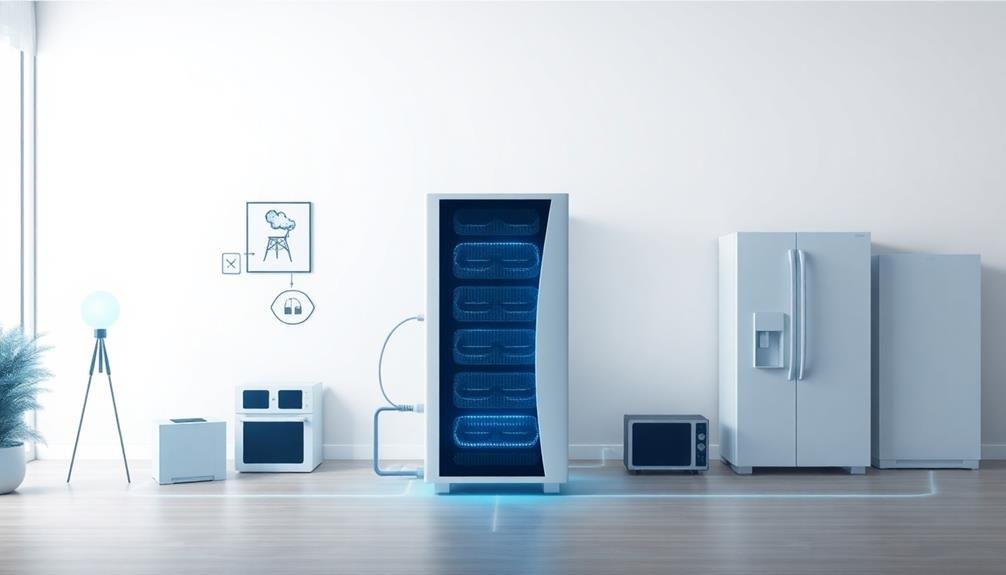
Fuel cells consistently provide an efficient solution for on-demand power generation in smart homes. You'll find that these electrochemical devices convert chemical energy from fuel directly into electricity, offering a reliable and clean power source.
Unlike traditional generators, fuel cells operate silently and produce minimal emissions, making them ideal for residential use. You can rely on fuel cells to deliver power whenever you need it, regardless of weather conditions or time of day.
They're particularly useful during peak demand periods or power outages, ensuring your smart home remains functional. Fuel cells can be scaled to meet your specific energy requirements, from powering essential appliances to supporting your entire household.
You'll appreciate the high efficiency of fuel cells, which can reach up to 60% for electricity generation alone. When used in combined heat and power systems, their efficiency can exceed 80%.
This means you'll get more usable energy from your fuel source, reducing waste and lowering your overall energy costs. Additionally, fuel cells can integrate seamlessly with your existing smart home systems, optimizing energy usage and further enhancing your home's efficiency.
Reduced Carbon Footprint
The environmental benefits of fuel cells extend far beyond their efficiency. When you integrate fuel cells into your smart home energy system, you're greatly reducing your carbon footprint. Unlike traditional power sources that rely on burning fossil fuels, fuel cells produce electricity through a clean electrochemical process, emitting only water vapor as a byproduct.
You'll notice a dramatic decrease in harmful emissions, including carbon dioxide, sulfur dioxide, and nitrogen oxides. This reduction helps combat climate change and improve local air quality. Fuel cells also minimize noise pollution, operating quietly compared to conventional generators.
By adopting fuel cell technology, you're contributing to a more sustainable energy future. You're reducing your dependence on the grid, which often relies on coal or natural gas-fired power plants. This shift towards cleaner energy sources helps decrease overall greenhouse gas emissions on a broader scale.
Moreover, fuel cells can be paired with renewable energy sources like solar or wind power, creating a truly green energy ecosystem for your home. This combination allows you to maximize your use of clean energy and further minimize your environmental impact.
Energy Independence and Reliability
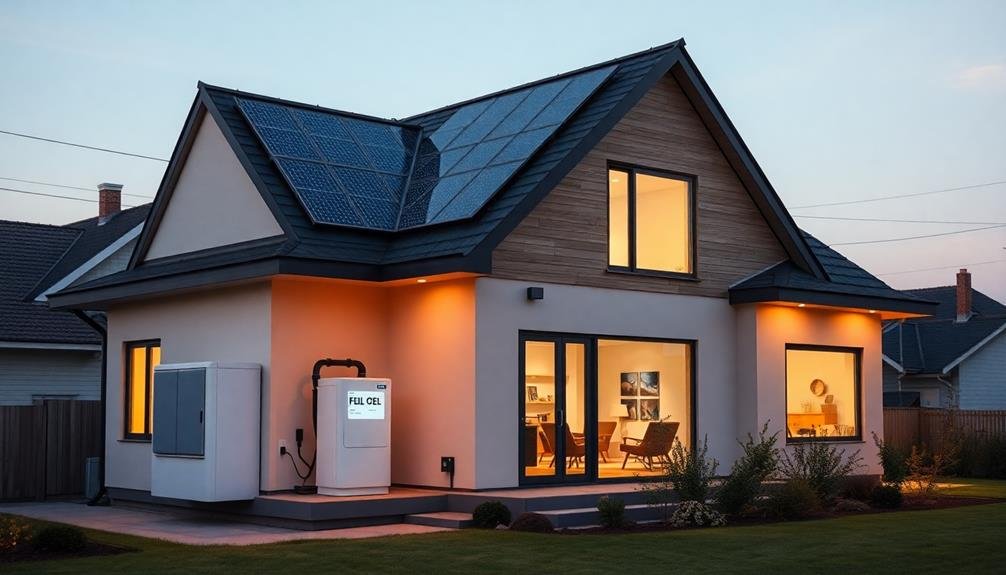
Independence from the grid is a key advantage of integrating fuel cells into your smart home energy system. You'll have a reliable power source that operates 24/7, regardless of weather conditions or grid outages. Fuel cells provide consistent electricity, ensuring your home remains functional during blackouts or natural disasters.
By generating your own power, you'll reduce reliance on utility companies and potentially lower your energy bills. You can even sell excess electricity back to the grid, further offsetting costs. Fuel cells offer greater control over your energy consumption and production, allowing you to optimize your home's efficiency.
| Aspect | Traditional Grid | Fuel Cell System |
|---|---|---|
| Reliability | Susceptible to outages | Constant power supply |
| Cost | Fluctuating rates | Stable, predictable costs |
| Control | Limited | Full user control |
Fuel cells also enhance your home's energy security. You're less vulnerable to cyber attacks or physical threats to the power grid. With a fuel cell system, you'll have peace of mind knowing your home can operate independently, maintaining essential functions like heating, cooling, and security systems even during prolonged outages.
Integration With Smart Grids
Beyond individual homes, fuel cells can seamlessly integrate with smart grids to create a more resilient and efficient energy network. You'll find that these systems can communicate with the grid, providing real-time data on energy production and consumption. This integration allows for better load balancing and more efficient distribution of power across the network.
With fuel cells connected to smart grids, you're able to:
- Sell excess energy back to the grid
- Participate in demand response programs
- Receive real-time pricing information
- Optimize your energy usage based on grid conditions
- Contribute to grid stability during peak demand periods
You'll appreciate how this integration enhances your home's energy management capabilities. During times of high demand or grid instability, your fuel cell can automatically increase production to support the grid. Conversely, when grid energy is abundant and cheap, you can reduce your fuel cell's output and rely more on grid power.
This dynamic interaction between your home and the grid not only benefits you financially but also contributes to a more sustainable and reliable energy infrastructure. As smart grids become more prevalent, fuel cells will play an increasingly important role in creating a decentralized, resilient energy network.
Cost-Effective Long-Term Energy Solution
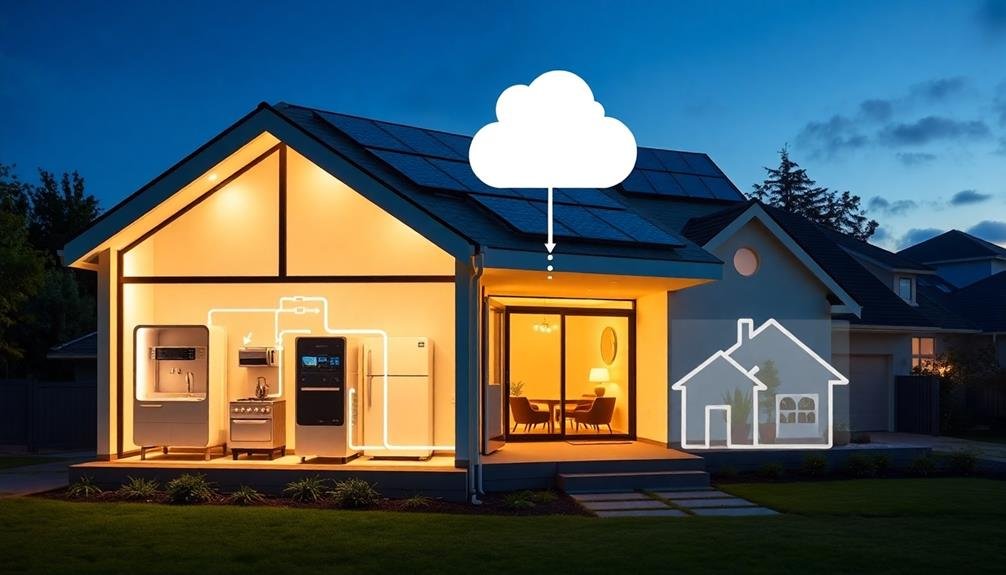
Investing in a fuel cell system for your smart home may seem costly upfront, but it's a financially savvy choice in the long run.
You'll benefit from lower energy bills, reduced maintenance costs, and increased energy independence. Fuel cells operate efficiently, converting fuel directly into electricity without combustion, resulting in minimal energy waste and lower operating expenses.
As fuel cell technology advances, production costs continue to decrease, making these systems more accessible to homeowners.
You'll also find that fuel cells have a longer lifespan compared to traditional energy systems, reducing the need for frequent replacements.
Additionally, many governments offer incentives and tax credits for adopting clean energy solutions, further offsetting your initial investment.
Frequently Asked Questions
How Do Fuel Cells Compare to Solar Panels for Residential Use?
You'll find fuel cells provide consistent power regardless of weather, unlike solar panels. They're more compact and don't require roof space. However, solar panels are generally cheaper and have lower maintenance costs for residential use.
Are There Safety Concerns With Storing Hydrogen for Fuel Cells?
Yes, you should be aware of safety concerns when storing hydrogen for fuel cells. It's highly flammable and can leak easily. You'll need proper ventilation, leak detection systems, and specialized storage tanks to mitigate risks in your home.
Can Fuel Cells Power an Entire House During a Power Outage?
Yes, fuel cells can power your entire house during an outage. They'll provide continuous electricity as long as you've got fuel. You'll need a properly sized system and adequate fuel storage to keep your home running smoothly.
What Maintenance Is Required for a Residential Fuel Cell System?
You'll need to perform regular maintenance on your residential fuel cell system. This includes replacing filters, checking for leaks, and cleaning components. You should schedule annual professional inspections and follow the manufacturer's recommended maintenance schedule for ideal performance.
How Long Does It Take to Install a Fuel Cell System?
You'll find that installation time varies, but it typically takes 1-3 days to set up a residential fuel cell system. It's a complex process involving electrical, plumbing, and gas connections, so professional installation is recommended.
In Summary
You've seen how fuel cells are transforming smart home energy. They're providing efficient, on-demand power while reducing your carbon footprint. You'll enjoy greater energy independence and reliability, plus seamless integration with smart grids. As a cost-effective long-term solution, fuel cells are revolutionizing the way you power your home. Embrace this technology, and you'll be at the forefront of sustainable, intelligent energy consumption. It's time to make the switch and future-proof your home.

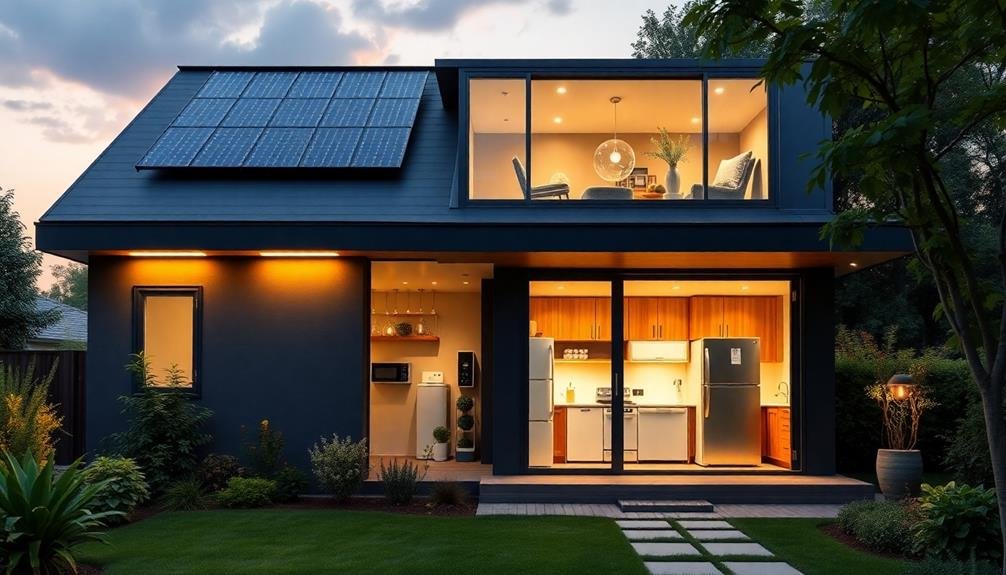

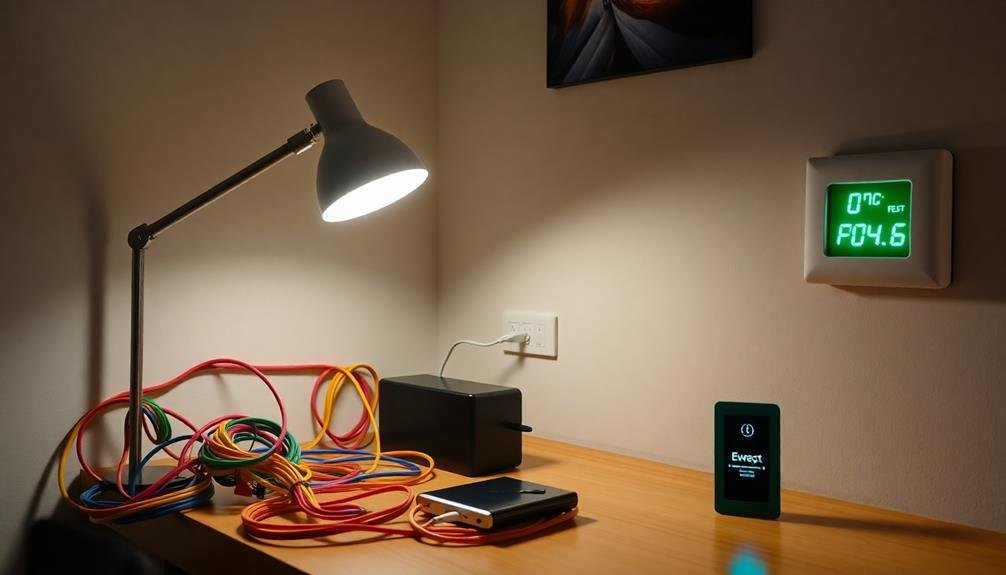

Leave a Reply